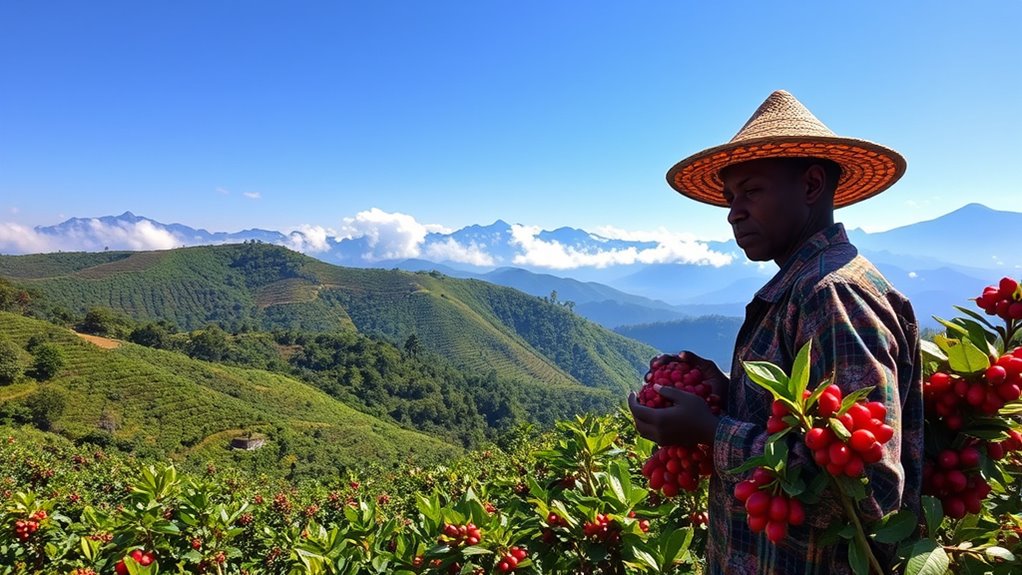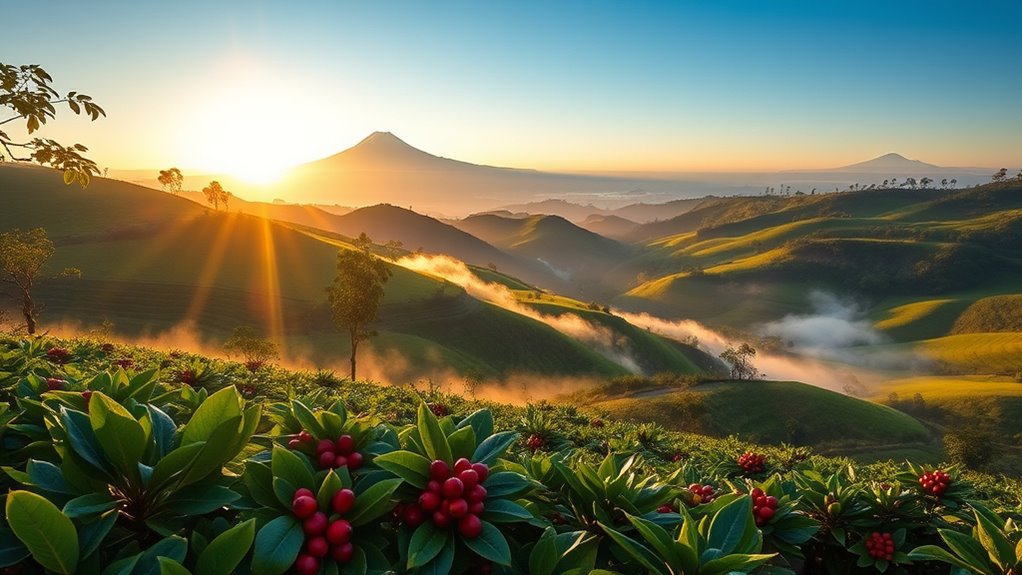Rwanda’s coffee industry is experiencing a remarkable revival, transforming it into East Africa’s rising star. By focusing on high-quality beans and sustainable farming practices, the country meets international demand for eco-friendly and ethically sourced coffee. This shift not only boosts the local economy but also helps protect the environment. If you want to learn how Rwanda’s farmers are shaping a greener future while gaining global recognition, keep exploring more about this exciting renaissance.
Key Takeaways
- Rwanda is experiencing a coffee industry revival driven by quality enhancement, sustainable practices, and innovation.
- Sustainable farming techniques are conserving resources, protecting land, and producing premium coffee.
- Increasing global demand for ethically sourced, high-quality Rwandan coffee boosts market position.
- Eco-friendly methods reduce costs and improve resilience, enabling access to premium markets.
- Rwanda is positioning itself as East Africa’s leading coffee exporter through sustainability and reputation building.

Have you noticed how Rwanda’s coffee industry is experiencing a remarkable revival? It’s a story of resilience, innovation, and dedication that’s transforming the country into a leading player in the global coffee scene. This resurgence is not just about higher quality beans but also about how farmers are adopting sustainable farming practices that protect the environment and ensure long-term productivity. By focusing on sustainable farming, Rwandan coffee producers are reducing their ecological footprint, conserving water, and maintaining soil health. This eco-conscious approach helps farmers produce premium coffee while preserving the land for future generations. As a result, Rwanda’s coffee is gaining recognition worldwide for its unique flavor profiles and ethical origins, making it highly desirable in the export market.
Rwanda’s coffee revival highlights sustainable practices that produce premium beans and protect the environment for future generations.
You might notice that Rwanda’s coffee is increasingly being sought after by international buyers who prioritize sustainability and quality. This demand fuels a cycle where farmers are motivated to continue implementing eco-friendly practices, which in turn boosts the country’s reputation as a responsible coffee exporter. The government and local cooperatives actively support these efforts, offering training programs on sustainable farming techniques and providing access to better resources. This collective effort helps farmers improve their yields and maintain high standards, ensuring that their coffee remains competitive on the export market. Additionally, ongoing research into sustainable farming practices supports farmers in adopting innovative methods that further enhance productivity and environmental stewardship.
In addition to environmental benefits, sustainable farming in Rwanda also means economic stability for farmers. By adopting methods such as organic fertilization, integrated pest management, and shade-grown coffee, producers reduce their reliance on costly chemicals and external inputs. This not only lowers production costs but also creates more resilient farms that can withstand climate fluctuations. As a result, farmers find themselves better equipped to meet the evolving demands of the export market, which increasingly favors ethically produced, high-quality coffee. The growing reputation of Rwandan coffee as a sustainable product opens doors to premium markets, allowing farmers to earn better income and reinvest in their communities.
The shift towards sustainability has also helped Rwanda carve out a niche in the competitive global coffee industry. Buyers are willing to pay a premium for coffee that aligns with their values of ethical sourcing and environmental responsibility. This means that your coffee, if you’re a producer or trader, can command higher prices and foster long-term relationships with international clients. Rwanda’s focus on sustainable farming and access to the export market is positioning it as East Africa’s rising star in coffee, promising continued growth and recognition for years to come.
Frequently Asked Questions
How Has Climate Change Affected Rwanda’S Coffee Production?
Climate change impacts your coffee production by causing unpredictable weather patterns and higher temperatures. You need to focus on building climate resilience and crop adaptation strategies to sustain your coffee farms. By adopting new farming techniques, diversifying crops, and improving water management, you can better withstand climate risks. Staying proactive helps protect your coffee quality and yield, ensuring your industry remains strong despite environmental challenges.
What Are Rwanda’S Main Coffee Export Markets?
You’ll find that Rwanda’s main coffee export markets include the United States, Europe, and regional neighbors like Uganda. Coffee export statistics show steady growth, driven by market diversification strategies that reduce reliance on a single region. These strategies help you understand how Rwanda expands its reach, boosting coffee sales globally. By focusing on diverse markets, Rwanda strengthens its coffee industry and enhances resilience against economic shifts or climate impacts.
How Does Rwanda Ensure Sustainable Coffee Farming Practices?
Think of Rwanda’s coffee farming as tending a delicate garden; you guarantee sustainability by embracing organic certification, which acts like a protective shield for the environment. You also prioritize water conservation, like saving precious drops for future growth. By adopting these practices, you help maintain healthy soils and ecosystems, securing a thriving coffee industry that benefits farmers, consumers, and the planet alike.
What Innovative Techniques Are Used in Rwanda’S Coffee Processing?
You’ll find that Rwanda employs several processing innovations, such as advanced fermentation methods and improved drying techniques, to enhance coffee quality. They also incorporate green technology, like solar-powered equipment and eco-friendly waste management, making processing more sustainable. These innovations help preserve the beans’ unique flavors while reducing environmental impact, ensuring Rwanda’s coffee remains competitive globally. Your appreciation for these modern methods highlights Rwanda’s commitment to quality and sustainability in coffee production.
How Do Local Rwandan Communities Benefit From Coffee Industry Growth?
You might think industry growth only benefits big players, but local communities truly thrive through community empowerment and cultural preservation. As the coffee sector expands, you see more jobs, better income, and opportunities for community projects. This growth helps preserve traditional farming methods and local customs, strengthening cultural identity. By supporting ethically sourced coffee, you actively contribute to the sustainable development and resilience of Rwandan communities.
Conclusion
As you witness Rwanda’s coffee revolution, you’re seeing a true miracle unfolding before your eyes. This tiny nation has transformed its coffee industry into a global powerhouse, rivaling the giants of the coffee world. With each cup, you taste the passion, dedication, and innovation that’s reshaping East Africa’s reputation. Get ready to be amazed – Rwanda’s coffee renaissance isn’t just a trend; it’s a seismic shift that’s rewriting history, one sip at a time.









